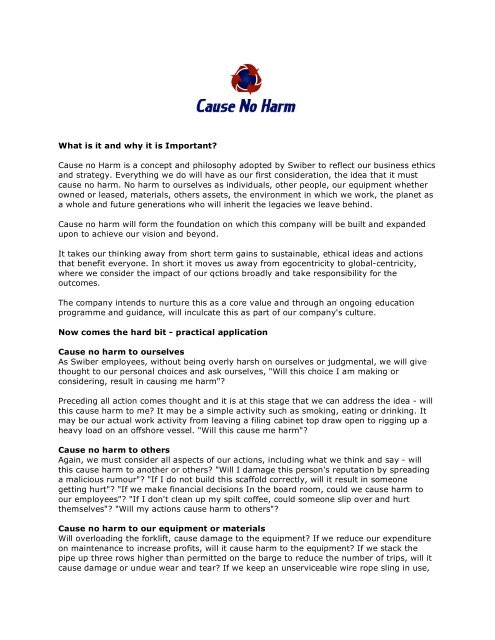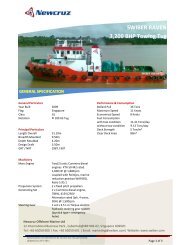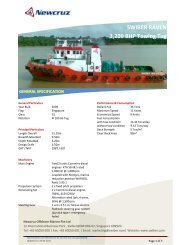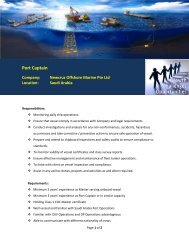What is it and why it is Important? Cause no Harm is a concept and ...
What is it and why it is Important? Cause no Harm is a concept and ...
What is it and why it is Important? Cause no Harm is a concept and ...
Create successful ePaper yourself
Turn your PDF publications into a flip-book with our unique Google optimized e-Paper software.
<strong>What</strong> <strong>is</strong> <strong>it</strong> <strong>and</strong> <strong>why</strong> <strong>it</strong> <strong>is</strong> <strong>Important</strong>?<br />
<strong>Cause</strong> <strong>no</strong> <strong>Harm</strong> <strong>is</strong> a <strong>concept</strong> <strong>and</strong> philosophy adopted by Swiber to reflect our business ethics<br />
<strong>and</strong> strategy. Everything we do will have as our first consideration, the idea that <strong>it</strong> must<br />
cause <strong>no</strong> harm. No harm to ourselves as individuals, other people, our equipment whether<br />
owned or leased, materials, others assets, the environment in which we work, the planet as<br />
a whole <strong>and</strong> future generations who will inher<strong>it</strong> the legacies we leave behind.<br />
<strong>Cause</strong> <strong>no</strong> harm will form the foundation on which th<strong>is</strong> company will be built <strong>and</strong> exp<strong>and</strong>ed<br />
upon to achieve our v<strong>is</strong>ion <strong>and</strong> beyond.<br />
It takes our thinking away from short term gains to sustainable, ethical ideas <strong>and</strong> actions<br />
that benef<strong>it</strong> everyone. In short <strong>it</strong> moves us away from egocentric<strong>it</strong>y to global-centric<strong>it</strong>y,<br />
where we consider the impact of our qctions broadly <strong>and</strong> take responsibil<strong>it</strong>y for the<br />
outcomes.<br />
The company intends to nurture th<strong>is</strong> as a core value <strong>and</strong> through an ongoing education<br />
programme <strong>and</strong> guidance, will inculcate th<strong>is</strong> as part of our company's culture.<br />
Now comes the hard b<strong>it</strong> - practical application<br />
<strong>Cause</strong> <strong>no</strong> harm to ourselves<br />
As Swiber employees, w<strong>it</strong>hout being overly harsh on ourselves or judgmental, we will give<br />
thought to our personal choices <strong>and</strong> ask ourselves, "Will th<strong>is</strong> choice I am making or<br />
considering, result in causing me harm"?<br />
Preceding all action comes thought <strong>and</strong> <strong>it</strong> <strong>is</strong> at th<strong>is</strong> stage that we can address the idea - will<br />
th<strong>is</strong> cause harm to me? It may be a simple activ<strong>it</strong>y such as smoking, eating or drinking. It<br />
may be our actual work activ<strong>it</strong>y from leaving a filing cabinet top draw open to rigging up a<br />
heavy load on an offshore vessel. "Will th<strong>is</strong> cause me harm"?<br />
<strong>Cause</strong> <strong>no</strong> harm to others<br />
Again, we must consider all aspects of our actions, including what we think <strong>and</strong> say - will<br />
th<strong>is</strong> cause harm to a<strong>no</strong>ther or others? "Will I damage th<strong>is</strong> person's reputation by spreading<br />
a malicious rumour"? "If I do <strong>no</strong>t build th<strong>is</strong> scaffold correctly, will <strong>it</strong> result in someone<br />
getting hurt"? "If we make financial dec<strong>is</strong>ions In the board room, could we cause harm to<br />
our employees"? "If I don't clean up my spilt coffee, could someone slip over <strong>and</strong> hurt<br />
themselves"? "Will my actions cause harm to others"?<br />
<strong>Cause</strong> <strong>no</strong> harm to our equipment or materials<br />
Will overloading the forklift, cause damage to the equipment? If we reduce our expend<strong>it</strong>ure<br />
on maintenance to increase prof<strong>it</strong>s, will <strong>it</strong> cause harm to the equipment? If we stack the<br />
pipe up three rows higher than perm<strong>it</strong>ted on the barge to reduce the number of trips, will <strong>it</strong><br />
cause damage or undue wear <strong>and</strong> tear? If we keep an unserviceable wire rope sling in use,
can <strong>it</strong> part <strong>and</strong> cause damage to equipment? if we leave sacks of cement out in the weather,<br />
can the water get inside <strong>and</strong> ruin the cement?<br />
Each time we must consider the outcome of our dec<strong>is</strong>ions, choices <strong>and</strong> actions regarding<br />
equipment <strong>and</strong> materials <strong>and</strong> ask ourselves "Will th<strong>is</strong> cause harm"?<br />
<strong>Cause</strong> <strong>no</strong> harm to other's assets<br />
Is there a chance a tow line could part <strong>and</strong> our barge fin<strong>is</strong>hes up colliding w<strong>it</strong>h a platform? If<br />
we abuse the leased photocopier, will <strong>it</strong> result in harm? If we drive recklessly in a rented<br />
vehicle <strong>and</strong> have a crash, we have caused harm to someone else's property. Whenever we<br />
are dealing w<strong>it</strong>h or operating other peoples or company's assets we have to ask ourselves,<br />
"Will th<strong>is</strong> cause harm"?<br />
<strong>Cause</strong> <strong>no</strong> harm to the environment<br />
We as a company do <strong>no</strong>t need to contribute further to damaging the immediate<br />
environment in which we work <strong>and</strong> cause more harm. By acting responsibly, we can<br />
embrace recycling, re-using <strong>and</strong> subst<strong>it</strong>uting hazardous materials <strong>and</strong> by doing so, cut down<br />
on the impact our work activ<strong>it</strong>ies have on the environment Before we tip a drum of used oil<br />
over the side of the vessel because <strong>no</strong>-one <strong>is</strong> around, we can ask ourselves, "Will th<strong>is</strong> cause<br />
harm"? Can we eliminate or reduce the source of pollution? Can we recycle these used<br />
<strong>it</strong>ems? Can th<strong>is</strong> hazardous material be treated so <strong>it</strong> <strong>is</strong> <strong>no</strong> longer harmful? Are our waste<br />
streams being d<strong>is</strong>posed of ethically? Every one of us can contribute to good environmental<br />
management <strong>and</strong> It will start by asking - will th<strong>is</strong> cause harm?<br />
<strong>Cause</strong> <strong>no</strong> harm to the planet as a whole<br />
Th<strong>is</strong> <strong>is</strong> a hot topic!! We are already seeing the adverse effects of global warming,<br />
deforestation, CO2 em<strong>is</strong>sions, waste build-up <strong>and</strong> pollution to air l<strong>and</strong> <strong>and</strong> water, etc, etc.<br />
Th<strong>is</strong> <strong>is</strong> an exp<strong>and</strong>ed view of the immediate environment whereby we must consider the long<br />
term effects of our dec<strong>is</strong>ions <strong>and</strong> actions <strong>and</strong> ask ourselves seriously, will th<strong>is</strong> cause harm?<br />
As a company we must act to reduce the burden placed on th<strong>is</strong> planet's ecosystems <strong>and</strong> all<br />
forms of life.<br />
One of these ways we can do th<strong>is</strong> <strong>is</strong> by putting a good waste management strategy in place,<br />
which aims to reduce the residual waste in the first pace through:<br />
• Reduction: generate less waste through more efficient practices<br />
• Reuse: re-use waste materials in their original form<br />
• Recycle: convert waste back into a reusable material<br />
• Recover: extract material or energy from waste for other uses<br />
• Residue: efficient d<strong>is</strong>posal of the remaining residues.<br />
There are many other ways in which we can contribute to arresting the polluting effects on<br />
th<strong>is</strong> planet <strong>and</strong> our starting point <strong>is</strong> when considering pur work <strong>and</strong> actions asking<br />
ourselves, "Will th<strong>is</strong> cause harm"?<br />
<strong>Cause</strong> <strong>no</strong> harm to future generations<br />
For those of us w<strong>it</strong>h children, th<strong>is</strong> idea should be at the forefront of or mind. We are<br />
borrowing th<strong>is</strong> planet from our children <strong>and</strong> therefore have the responsibil<strong>it</strong>y to h<strong>and</strong> <strong>it</strong> to<br />
them in good cond<strong>it</strong>ion. <strong>What</strong>ever harm we do <strong>no</strong>w will harm all future generations <strong>and</strong> they<br />
will have to deal w<strong>it</strong>h <strong>it</strong>. They will have to clean up our mess or adapt to a lower qual<strong>it</strong>y of<br />
life, therefore we have to ask ourselves, will my or our collective actions today, cause harm<br />
to future generations.
Finally, we are all equipped w<strong>it</strong>h the abil<strong>it</strong>y to make choices, which <strong>is</strong> the wonderful gift we<br />
have been endowed w<strong>it</strong>h. We can choose what we eat, what we read, which movie we see,<br />
what car to buy, where to go on holidays, etc, etc. Now, individually <strong>and</strong> collectively as a<br />
company, you are being inv<strong>it</strong>ed to make choices that will cause <strong>no</strong> harm.<br />






